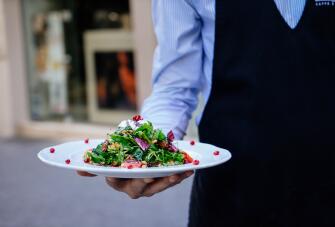Food Truck Cost: Read The List of Expenses For a Food Van
“Eating on the go” has a whole new twist with food trucks. Now, rather than sitting in a restaurant, your favorite sandwiches, tacos, and other delicious food can be cooked up, wrapped up, and handed over to you in minutes.
Food trucks have really taken off over the last decade. In fact, as of 2023, there are about 47,000 food trucks in the US alone - a 15.8% jump from 2022. What started as simply a cool trend is now a big part of the food scene, with mobile eateries popping up everywhere. Lots of chefs and restaurant dreamers are turning to food trucks because they’re cheaper and less risky than opening a full service, brick and mortar restaurant.
Before you get too excited, one big question remains: how much does it actually cost to start a food truck?
Starting a food truck seems like it should be cheaper than a traditional brick and mortar restaurant, but the costs can add up, especially depending on where you park. So, let’s get into what you need to know about food truck startup costs.
How much does a food truck cost?
New food trucks usually cost between $50,000 and $175,000, and they can take some time to build. If you’re looking at a used food truck, you’re looking at $30,000 to $70,000, and you can use them right away after a bit of maintenance.
You’ve also got to think about other costs like paying your staff, buying ingredients, getting insurance, and marketing your truck. Plus, there are some food truck-specific costs:
-
The upkeep of the truck itself
-
Equipment and decorations / food truck interior
-
Commercial kitchen space and parking
-
Permits and licenses
Let’s break all this down and figure out food truck costs to get your food truck rolling!
Initial startup costs for a food truck
Here's what food truck operators will need to pay upfront to start a food truck business.
Buying or renting a food truck business
One of the biggest decisions for new food truck owners is whether to rent or outright buy their truck. This choice can have a huge impact on your costs.
Buying a new, custom-built food truck can set you back anywhere from $50,000 to $175,000, and it can take a few months to get it ready. Now the food truck cost to buy is much more than to rent. Used trucks are cheaper, usually costing between $30,000 and $70,000, and you can usually start using them right away. How much does it cost to rent a food truck, you ask? Well, for this food truck price, expect to pay around $2,000 to $3,000 per month for a lease that’s six months or longer.
Factors influencing food truck prices
So, you’re thinking about diving into the food truck world? Cool! But before you hit the road, you should know what’s gonna affect those truck prices. Here’s the lowdown on what can make or break your budget:
-
Size and customization: Bigger trucks and those with custom features are going to cost you more. If you want a fully decked-out kitchen with all the bells and whistles, be prepared to shell out some serious cash. Food truck design ideas that are more minimalistic may be favourable.
-
Equipment and features: What you put inside your truck matters too. Fancy equipment and high-tech appliances are pricier. If you’re looking at high-end fryers or ovens, expect your costs to climb.
-
Location, Location, Location: Where you buy your truck can affect the price. Trucks in big cities or high-demand areas might be more expensive. It’s kind of like real estate—prices can vary based on the location!
-
Condition and maintenance: The condition of a used truck plays a big role in the price. Trucks that have been well-maintained or refurbished will cost more. It’s like purchasing a used car that’s been kept in top shape—expect to pay a premium for a truck that’s in excellent condition.
Food truck license and permit cost
Licenses and permits can really add up when you’re starting a food truck. On average, the U.S. Chamber of Commerce’s Food Truck Index estimates that you’ll need around $28,276 for a food truck permit, licenses, and legal stuff to keep your truck rolling for a year.
There are five main types of permits and licenses you’ll need:
-
Administrative
-
Health/food safety
-
Vehicle safety
-
Employment
-
Zoning.
The cost of these permits can vary a lot depending on where you are. Some cities are super friendly to food trucks, like Portland (Oregon), Denver, Orlando, Philadelphia, and Indianapolis. Others are a lot tougher, like Boston, Washington, D.C., San Francisco, Minneapolis, and Seattle.
For example, Indianapolis has the lowest fees at about $590, while Boston’s fees are sky-high at $17,066. Seattle is also pricey at around $6,211. If you take Boston out of the mix, the average cost for permits and licenses in other top food truck cities is about $1,864.
Food truck equipment
The kitchen equipment you need really depends on what you’re serving, but most food trucks use ovens, fryers, grills, and fridges. You’ll also need pots, pans, storage containers, knives, and other utensils.
Big appliances can cost a ton, often running into the thousands. And smaller stuff like pots and pans can add up to a few thousand dollars too. If you’re just starting out and juggling a bunch of other costs, it might be smart to lease some of your equipment at first. It's a great way to save money and, this way, you can figure out what you actually need and save up for the long haul.
Initial inventory
When you’re getting your food truck up and running, you’ll need some basic stuff to get started. First off, you’ll need ingredients for whatever delicious items you’re serving. How much you spend here really depends on your menu, but you should budget around $1,000 to $2,000. This includes things like cooking oil, spices, and other ingredients.
You’ll also need serveware like plates, cups, lids, utensils, and napkins. Getting all this together usually costs about $300 (though this is just an estimated cost). So, plan for those costs and make sure you have everything you need to start serving up tasty treats!
Insurance
Insurance is a must-have for running your food truck. It protects you from various risks and helps you avoid big financial hits if something goes wrong.
Here are a few types of insurance you should consider:
-
Liability insurance: This covers you if someone gets injured or their property gets damaged because of your food truck. It’s essential for protecting your business from lawsuits.
-
Vehicle insurance: Like any vehicle, you need insurance for your food truck. This covers damage to your truck from accidents or theft.
-
Property insurance: This protects the equipment and supplies inside your truck. If anything gets damaged or stolen, this insurance cost helps cover the cost of replacing it.
-
Workers’ compensation: If you have employees, this insurance is crucial. It covers medical expenses and lost wages if an employee gets hurt while working.
Insurance costs can vary depending on the coverage you choose and your location. It’s worth investing in good insurance to keep your food truck running smoothly and protect yourself from unexpected issues.
Operational costs in a food cart business
Now that you've got your business up and running, you're going to need to keep it that way by paying operational costs and maintenance costs. These include:
Food truck monthly gas estimate
Running a food truck means driving around a lot which means you’ll need to keep an eye on your gas tank. On average, you should budget about $300 to $500 a month for fuel.
How much you actually spend can vary depending on a few things. If you’re always on the move, visiting different events or locations, you’ll probably end up spending more. Plus, gas prices can fluctuate, so they might be higher or lower depending on where you are and the current fuel rates.
So, keep track of your mileage and check gas prices regularly. It’s a good idea to budget a bit more just in case, so you’re not caught off guard by unexpected costs.
Inventory management
Keeping track of your inventory is super important for running a successful food truck. It’s not just about managing your ingredients like meat, veggies, and spices. You also need to keep an eye on supplies like napkins, containers, and utensils.
You’ll be spending around $1,000 to $2,000 a month on inventory, but this can change depending on what’s on your menu and how much you sell.
With a POS system, you’ll get alerts when you’re running low on something, making it way easier to reorder before you run out. Plus, it can save you time and avoid errors compared to doing everything manually. So, investing in a solid POS system can really help keep your food truck running smoothly and make your life a whole lot easier.
Staff salaries
If you’re not running the food truck solo, you’ll need to pay your staff. For the sake of this article, let's say you're going to be paying your team minimum wage.
The federal minimum wage is $7.25 per hour. However, many states have their own minimum wage laws, and if the state minimum wage is higher than the federal rate, employees are entitled to the higher wage.
Remember though, you want a team of pros who are going to provide a great food service to your hungry customers. Because of that, be sure to look at what salaries your competitors are paying their team, so that you have a general rule of thumb.
Marketing services for your food truck business
Getting your food truck noticed is key to drawing in customers. Good marketing helps spread the word and keeps your truck on people’s radar.
Now, good marketing doesn't need to be expensive and there's a ton of free or low-cost ways to shout about your business.
Start by doing some social media marketing. Platforms like Instagram, Facebook, and Twitter are perfect for showcasing your tasty dishes, sharing your location, and engaging with your customers.
Don’t forget about local marketing! Hand out flyers, create eye-catching business cards, and maybe even team up with local events or festivals. It’s also a good idea to get listed on food truck directories and apps so people can easily find you.
A website can also be super helpful. It gives you a place to post your menu, share your schedule, and provide contact info. Plus, it helps boost your online presence and makes your food truck look more professional.
Utilities and parking
So, where do food trucks hang out after a long day of serving up delicious food? They need a safe, city-approved spot to park overnight. Lots of cities have strict rules about where food trucks can park, both while they're open for business and when they’re not.
If you’ve got room to park your truck at home on private property, that’s great. But if not, you can usually find commissaries that offer overnight parking for an extra fee. Make sure to factor this in when you’re picking out your commercial kitchen space. Overall, you’re looking at around $500 to $1,000 a month for parking.
Food truck POS system that helps you to stay on the go
Serve from anywhere with advanced, cloud-based POS technology for food trucks. Get on the road to business success.
Tips to save up on your food truck expenses
Looking to keep your taco truck cost under control? Here are some tips to help you save a few bucks:
Effective budget management
First things first: you need a budget. Figure out how much you can spend on everything—gas, inventory, marketing, payroll, and insurance.
Grab a budgeting app or just a good old-fashioned spreadsheet to track where your money’s going.
Check in regularly (and compare against competitors also using the food truck business model) to make sure you’re not spending more than you should. Think of it like a diet for your bank account—no sneaky spending allowed!
Track inventory levels in real time
A good food truck POS system isn’t just for processing payments. Nope, it’s also great for managing your inventory. By tracking your stock in real time, you’ll get alerts when you’re running low on key ingredients or supplies. This helps you avoid running out of essential items and prevents overstocking, which can lead to waste. Imagine having a personal assistant who tells you when you’re about to run out of your favorite snacks—super handy, right?
Rent or buy used equipment
New equipment can be pricey, so consider renting or buying used gear. Many food trucks start out with pre-owned equipment and make it work perfectly fine. Just make sure you’re buying from a trustworthy source and that everything’s in good shape.
Buy in bulk to keep costs down
Buying ingredients and supplies in bulk can save you a lot of money. Items like flour, sugar, and cleaning supplies often come with discounts when purchased in larger quantities. Plus, bulk buying reduces the frequency of your shopping trips, saving you time and hassle.
Create an attractive menu efficiently
Design a menu that not only appeals to customers but also helps keep costs low. Choose dishes that use similar ingredients, so you’re buying in bulk and minimizing waste. Streamline your menu to focus on items that are popular and profitable.
How Epos Now Payments Can Boost Your Food Truck Game
If you’re running a food trailer, you need payment processing that’s as on-the-go as you are. That’s where Epos Now Payments comes in.
With Epos Now Payments, you can handle all your transactions at a fixed rate with zero hidden fees. No more surprises when you check your statement! Plus, it integrates smoothly with your existing POS system, so you get everything from one portal.
Your customers want choices, and Epos Now gives them plenty. From chip and pin to contactless and remote payments, you can offer all the latest methods. Whether they’re paying with a credit card, digital wallet, or even Apple Pay, Epos Now has you covered.
Keep tabs on your inventory with detailed reports that are just a click away. Epos Now Payments provides real-time insights into your cash flow, helps simplify bookkeeping, and even tracks all your transactions.
Ready to streamline your payments? Reach out and see how Epos Now can work for you!
FAQs about the price of a food truck business
- What permits do I need for a food truck in California?
-
In California, you’ll need a bunch of permits to get rolling. These include a food handler’s permit, a health permit, a business license with your food truck name, and often a special food truck permit from your city or county. You might also need a commissary agreement and possibly even a fire department permit. It sounds like a lot, but it’s all about keeping things safe and legal! Researching how to start a food truck business beforehand will help here.
- What is a fixed cost for a food truck?
-
Fixed costs are expenses that stay the same each month, no matter how much you’re selling. For a food truck, this usually includes things like your truck payment, insurance, and any monthly commissary fees. It’s like the stuff you can’t really change no matter how busy you get! Then you've got the additional costs that can be changed.
- Do food trucks pay for locations?
-
Yep, food trucks often have to pay for the spots where they park and serve. This can be a daily or monthly fee and might vary based on the location and event. Some places are more expensive than others, so it’s worth checking out your options and budgeting for this.
- What is the profit of a food truck?
-
Profit margins for food trucks can vary a lot, but generally, they hover around 7% to 8%. If your food truck is a big hit, you might see margins closer to 14% to 15%. On average, a food truck in a big city can rake in anywhere from $20,000 to $50,000 a month in sales. So, the potential is there, but how much you actually make depends on how well you manage costs and attract customers!



